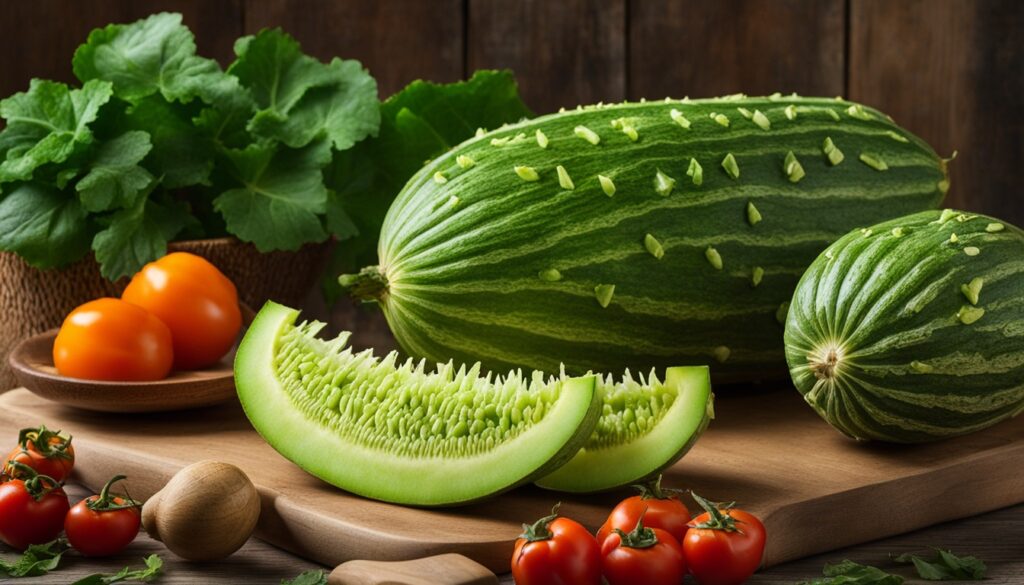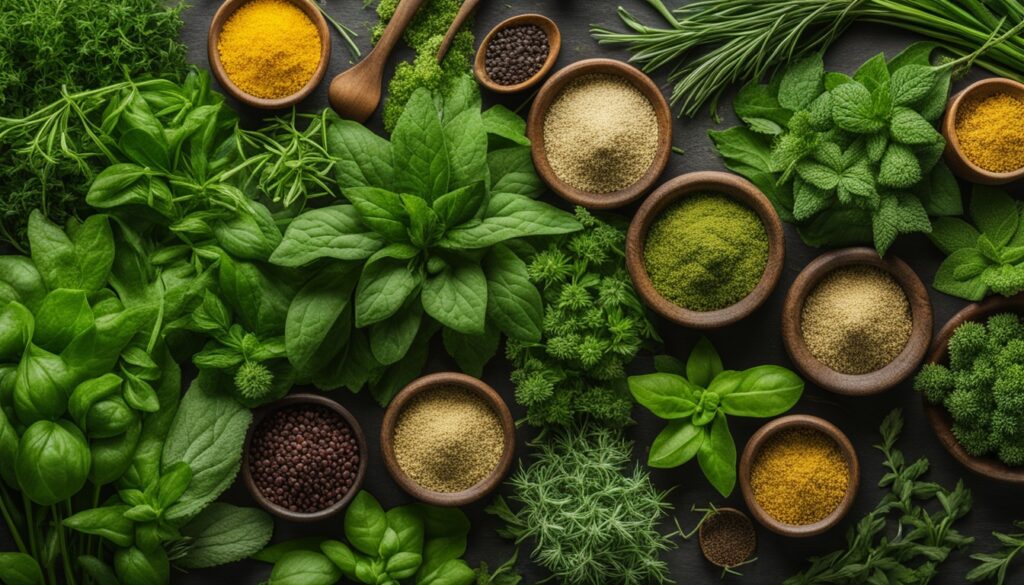Maintaining blood sugar wellness is crucial for overall health, particularly for individuals managing type 2 diabetes. Sugar level stability supplements and glucose management herbs play an important role in supporting blood sugar control. When combined with traditional treatments, herbal glucose support can help ease diabetes symptoms and reduce the risk of complications. Additionally, antioxidant blood sugar defense can provide extra protection to your health.
However, it’s important to remember that these supplements and herbs are not a replacement for your regular treatment. They should be used as a complementary approach, and always consult a medical professional before adding them to your routine—especially if you’re on other medications, as interactions are possible.
Key Takeaways
- Herbs and supplements can be used alongside conventional diabetes treatments to support blood sugar management.
- These natural remedies may help alleviate symptoms and reduce the risk of complications, but they cannot cure diabetes.
- The FDA does not regulate herbs and supplements, so it’s important to consult with a healthcare professional before use.
- Certain herbs and supplements, such as aloe vera and bitter melon, have shown potential benefits in managing blood sugar levels.
- Incorporating a holistic approach that combines lifestyle changes, medications, and select natural remedies can be an effective strategy for managing type 2 diabetes.
Introduction to Natural Blood Sugar Management
In diabetes care, herbs and supplements are getting more attention as a way to help manage blood sugar levels. They can’t cure diabetes, but they might help control blood sugar and lower the risk of complications when used with standard treatments.
The Role of Herbs and Supplements in Diabetes Care
The 2022 American Diabetes Association (ADA) says there’s no strong proof that herbs or supplements help people with diabetes alone. But, some natural products might ease diabetes symptoms and help manage blood sugar when used with regular treatments. Always talk to a healthcare professional before adding herbs or supplements to your diabetes plan. They can interact with medicines and be harmful if taken too much.
Benefits and Considerations of Natural Remedies
Studies are still coming in on how well natural remedies work for diabetes. Some herbs and supplements look promising for helping with insulin resistance and lowering blood sugar. Options like cinnamon, bitter melon, and fenugreek are being studied. But, be careful and talk to a healthcare provider before trying these as an alternative to traditional dia
betes treatments.
| Recommendation | Details |
|---|---|
| Moderate Aerobic Activity | Adults should aim for at least 150 minutes a week of moderate aerobic activity, ideally about 30 minutes a day on most days of the week. |
| Strength-Building Exercises |
|
| Limiting Sugary Drinks | Consuming sugary drinks can lead to a rapid rise in blood sugar levels, hence it’s best to limit their intake for people with diabetes. |
| Snacking During Exercise | When exercising with low blood sugar levels, it is recommended to have a small snack containing 15 to 30 grams of carbohydrates to prevent hypoglycemia. |
| Insulin Storage | Insulin should be kept away from extreme heat or cold, avoiding freezer storage or direct sunlight exposure to maintain its effectiveness. |
| Sick Day Management | People with diabetes need to plan ahead for sick days with a healthcare team to determine the appropriate medication adjustments and monitoring needed during illness. |
Be careful and get advice from a healthcare provider before using herbs and supplements for diabetes. These natural remedies might help, but they shouldn’t replace regular medical care.Maintaining healthy blood sugar levels is crucial for overall well-being, yet many struggle to keep their glucose in check. This is where natural supplements can make a difference, offering support without harsh chemicals. If you’re seeking a solution that promotes balanced blood sugar naturally, you might want to explore this option.
Aloe Vera: A Potent Antioxidant for Blood Sugar Control
Aloe vera is a plant known for healing and soothing skin. It might also help people manage their natural blood sugar balance. Research shows that its antioxidants could protect and fix the pancreas cells that make insulin. This could lead to better herbal glucose support.
Studies indicate that aloe vera supplements can lower blood sugar levels and reduce the risk of diabetes complications. It might also make insulin work better, lessen inflammation, and protect against diabetes-related issues. This makes aloe vera a strong antioxidant blood sugar defense.
“Aloe vera has been used traditionally for its medicinal properties, and now we’re seeing scientific evidence to support its potential role in managing blood sugar levels,” says Dr. Sarah Lentz, a leading researcher in the field of natural diabetes management.
But, we need more human studies to be sure aloe vera is safe and works for diabetes. People with diabetes should talk to their doctors before trying aloe vera products. They might need to change their current treatments.
The current evidence points to aloe vera as a helpful addition to managing natural blood sugar balance and antioxidant blood sugar defense. It could be part of a broader approach to herbal glucose support and botanical insulin resistance support. Always use natural remedies with care and with a healthcare professional’s advice.
Cinnamon: A Flavorful Spice with Hypoglycemic Properties
Cinnamon is a spice loved for its warm, aromatic taste. It’s now seen as a natural way to help keep blood sugar levels healthy. Studies show cinnamon can make fasting and after-meal blood sugar better in people with diabetes or prediabetes.
Types of Cinnamon and Their Effects on Glucose Levels
Not all cinnamon is the same when it comes to glucose levels. There are two main types: Cinnamomum cassia (Chinese or Cassia cinnamon) and Cinnamomum verum (Ceylon or true cinnamon). Research says Cinnamomum cassia might be better at lowering blood sugar than Cinnamomum verum.
Dosage and Potential Interactions
The right amount of cinnamon for blood sugar support varies. Taking 120 mg to 6 grams daily for four to 18 weeks can help lower fasting plasma glucose. But, if you’re thinking about cinnamon supplements, talk to a healthcare professional first. Cinnamon can affect how some medicines work, like diabetes drugs, blood thinners, and liver medications.
In conclusion, cinnamon is great for managing blood sugar thanks to its hypoglycemic effects. Knowing about the different types of cinnamon and how much to take is key. This way, people can use cinnamon as a tasty, natural way to keep glucose levels healthy.
Bitter Melon: An Acquired Taste with Glucose-Lowering Potential
Bitter melon, also known as karela, is a fruit used in traditional medicine for diabetes. Studies show it can help control blood sugar and lower blood fats. It might also help lower blood sugar levels, making it a good natural choice for herbal glucose support or botanical insulin resistance support.
The bitter taste of bitter melon might not be liked by everyone at first. But, it can be made more enjoyable in many ways. You can find it as powder, supplements, juice, or the fruit itself. In many cultures, it’s added to soups, stir-fries, and curries, or eaten fried or stuffed.
Research shows that bitter melon extract can stop breast cancer cells from growing. This means it could help with more than just glucose management herbs and herbal glucose regulation. But, it should not replace insulin or other treatments. Always talk to a healthcare professional before using it.
Blood sugar imbalances can lead to various health issues, from energy fluctuations to more serious conditions. While diet and exercise are essential, adding a supplement to your routine can enhance your efforts. This supplement, designed with potent natural ingredients, aims to support healthy glucose levels. Discover more about its benefits and how it works by visiting here.
| Nutrient | Amount per Cup (93g) of Karela Juice | % of Reference Daily Intake (RDI) |
|---|---|---|
| Calories | 16 | – |
| Carbohydrates | 3.4g | – |
| Fiber | 2.6g | – |
| Protein | 0.9g | – |
| Fat | 0.2g | – |
| Vitamin C | 95% | – |
| Folate | 17% | – |
| Zinc | 10% | – |
| Potassium | 6% | – |
| Iron | 5% | – |
| Vitamin A | 4% | – |
Bitter melon can be a good option for managing blood sugar, but use it carefully. Start with 50-100ml of juice a day or follow a doctor’s advice. Eating too much can cause stomach problems or low blood sugar. Pregnant women should avoid it. With the right preparation and advice, bitter melon can be a natural way to control blood sugar levels.

Milk Thistle: A Liver Tonic with Modest Glycemic Benefits
Milk thistle comes from the Mediterranean and has been used for health benefits for a long time. Its extract, silymarin, is known for helping the liver. Some studies also show it might help with glucose management herbs and botanical insulin resistance support.
The 2022 American Diabetes Association (ADA) says there’s no strong proof that herbs or supplements help people with diabetes alone. But, some studies suggest silymarin could slightly affect blood sugar levels.
A 2016 review showed that milk thistle might help lower levels of both fasting blood glucose and hemoglobin A1C. These are key for diabetes diagnosis and care. A 2021 study also found it helped improve liver function in people with non-alcoholic fatty liver disease who took the supplement.
These results are encouraging, but experts don’t suggest using milk thistle alone for herbal glucose support. It’s usually safe, but it can cause nausea, diarrhea, and bloating. Always talk to a healthcare professional before trying milk thistle, especially if you have diabetes or other chronic conditions.
“The Food and Drug Administration (FDA) does not regulate herbs and supplements, making product consistency an issue as different products may contain various herbs and fillers.”
This highlights the need for high-quality milk thistle supplements from trusted brands. Be aware of possible interactions with other medicines. While milk thistle may have some glucose management benefits, use it carefully and with a healthcare professional’s advice as part of a full diabetes care plan.
Fenugreek: A Seed for Delaying Diabetes Onset
For those worried about getting type 2 diabetes, fenugreek seed could be a game-changer. Studies suggest it can lower the risk of getting type 2 diabetes, especially for those with prediabetes.
Fenugreek works by slowing down how fast carbs and sugars are broken down. This helps keep blood sugar levels healthy. It also reduces the strain on insulin production and sensitivity.
You can add fenugreek to your diet in many ways. Try cooking with it, drinking it in warm water, or taking it as a powder or supplement. No matter how you take it, fenugreek is a great choice for supporting healthy glucose management and delaying type 2 diabetes.
“Fenugreek has shown promising results in studies for its ability to delay the progression from prediabetes to full-blown type 2 diabetes. Its unique properties in regulating carbohydrate metabolism can be a game-changer for those at risk of developing this chronic condition.”
| Fenugreek Benefits for Diabetes Prevention | Scientific Evidence |
|---|---|
| Slows carbohydrate digestion and absorption | A 2021 review found fenugreek reduced postprandial glucose levels in individuals with prediabetes or diabetes. |
| Increases insulin production and sensitivity | Several studies have shown fenugreek can enhance insulin secretion and improve insulin resistance. |
| Reduces risk of progressing from prediabetes to type 2 diabetes | A study found people with prediabetes were less likely to develop type 2 diabetes while taking fenugreek powder. |
Adding this versatile seed to a balanced diet can help manage glucose levels. It’s a proactive step for those at risk of type 2 diabetes. Fenugreek is a great option for herbal glucose support and botanical insulin resistance support.
Gymnema Sylvestre: The “Sugar Destroyer” of Ayurvedic Medicine
Gymnema sylvestre is an herb from Ayurvedic medicine. It’s known for helping with herbal glucose support, glucose management herbs, and herbal glucose regulation. It’s also seen as a way to support botanical insulin resistance support and other health benefits.
Potential Benefits Beyond Blood Sugar Regulation
Gymnema sylvestre does more than just help control blood sugar. It could also improve your health in other ways. Studies show it might:
- Increase antioxidant levels and decrease oxidative stress
- Lower cholesterol and triglyceride concentrations
- Support weight management by reducing fat accumulation
- Enhance insulin production and improve insulin sensitivity
- Exhibit anti-inflammatory properties
A study with humans showed that Gymnema made people less likely to want sweets. This could help those trying to manage their herbal glucose support and glucose management herbs.
This herb comes from India and has been used for thousands of years in Ayurvedic medicine. It’s known as “gurmar,” meaning “sugar destroyer.” This name comes from its ability to block the taste of sweetness for an hour.
If you’re thinking about trying Gymnema sylvestre, talk to a healthcare professional first. They can help you decide if it’s right for your herbal glucose regulation or botanical insulin resistance support plan.
Many have found success by incorporating a blood sugar supplement into their daily regimen. These supplements often contain herbs and nutrients known for their ability to help maintain stable blood sugar levels. For those interested in a natural approach, learning more about this specific product could be the first step towards better health. Find out more by clicking here.
natural blood sugar balance, herbal glucose support, blood sugar wellness
Keeping blood sugar levels healthy is key for good health. But, it can be hard for many people. Luckily, there are natural and herbal ways to help. But, always talk to a doctor before trying them.
Some herbs and supplements might not mix well with your medicines. For example, Gymnema sylvestre or bitter melon could affect your diabetes meds. This could lead to low blood sugar or other issues. Always check with a healthcare provider before using these products.
Herbal supplements can be different in quality. They’re not checked by the FDA like regular drugs. It’s important to buy from trusted sources. Choose products tested by others and made in clean facilities.
“Herbal remedies can be a valuable addition to a comprehensive diabetes management plan, but they should never be used as a substitute for prescribed medications or professional medical advice.”
Some herbs like cinnamon, bitter melon, fenugreek, and Gymnema sylvestre might help with blood sugar. They could also make insulin work better and protect against harm from free radicals. But, we need more studies to know how well they work and how much to take.
Deciding to use natural remedies should be a team effort with your doctor. Together, you can create a plan that includes both traditional and natural ways to manage your blood sugar. This can help you take care of your overall health.

Conclusion
Lifestyle changes and medicines are key to managing type 2 diabetes. But, some natural herbs and supplements can also help. Cinnamon, bitter melon, and milk thistle may help control blood sugar and lower diabetes risks. Always talk to a doctor before trying new supplements because they can affect medicines.
Studies are still looking into how well these natural remedies work. More research is needed to know their full benefits. These natural options should not replace regular diabetes care. This includes eating right, exercising, and taking medicines as your doctor says.
Managing type 2 diabetes needs a mix of traditional and natural treatments. By working with a healthcare team and making smart choices about supplements, people with diabetes can stay healthy. This approach helps in taking care of their overall health and well-being..
In conclusion, taking control of your blood sugar levels is vital for long-term health. A natural supplement can provide the additional support needed to keep your glucose levels stable. If you’re considering such an option, be sure to check out this supplement that could be a game-changer for your health.
FAQ
Can herbs and supplements cure diabetes?
No, herbs and supplements can’t cure diabetes on their own. They’re not a cure. But, they can help ease symptoms and lower the risk of complications when used with regular treatment.
Are herbs and supplements regulated by the FDA?
No, the FDA doesn’t regulate herbs and supplements. This means their quality, safety, and how well they work can vary. Always talk to a healthcare professional before trying them, especially if you’re on other meds, as they might not mix well.
How do herbs and supplements work for diabetes management?
Herbs and supplements might help by protecting insulin-producing cells, making insulin work better, reducing inflammation, and lowering blood sugar. But, we’re still learning about their effects, and results can differ from person to person.
What are some popular herbs and supplements for diabetes?
Popular herbs and supplements for diabetes include aloe vera, cinnamon, bitter melon, milk thistle, fenugreek, and gymnema sylvestre. They might help control blood sugar, but always check with a healthcare professional before starting them.
Are there any safety concerns with using herbs and supplements for diabetes?
Yes, there are safety worries. Herbs and supplements can affect how other medicines work and be harmful in big doses. Always work with a healthcare professional to use them safely, especially if you have diabetes.
